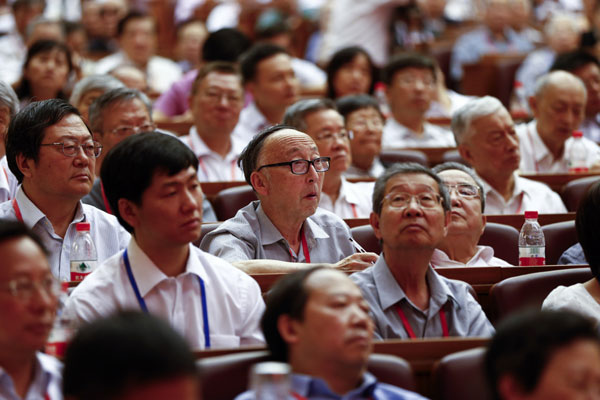 |
|
Academicians attend a meeting of the Chinese Academy of Sciences and Chinese Academy of Engineering on Tuesday. A series of reforms concerning China's academician selection and management system were released after the meeting. Feng Yongbin / China Daily |
|
 |
| Academicians could lose status for ethics lapses? |
A change in China's academician system will allow one's title to be revoked in cases of severe ethical lapses.
The Chinese Academy of Sciences released the amendment to its academician regulation on Thursday.
The CAS said the amendment also reforms academician selection and recommendations.
The amendment states that academicians have the right to give up the title and becoming a citizen of a foreign country will be considered a voluntarily relinquishing of academician status.
The Chinese Academy of Engineering confirmed its own amendment on the same issues on Wednesday.
China has 1,545 academicians, all of whom are members of the CAE or CAS. Every two years, the bodies select new academicians, and the selection and management regulations are amended.
CAS said in statement released on Thursday that the amendment is necessary because the honor of being an academician is affected by complex and nonscholarly factors.
The amendment is seen as the latest move to restore the reputation of the academician honor following a series of recent scandals.
"If a scholar, not even an academician, is guilty of any type of academic fraud, he or she should be disqualified," CAS academician and expert on vegetation ecology Zhang Xinshi said on Thursday.
Wang Yue, a CAS academician and an expert in telecommunications, agreed that disqualifying scholars with ethical problems is necessary to protect the reputation of the group.
But Xiong Bingqi, vice-president of the 21st Century Education Research Institute, said the amendment failed to meet public expectations, which included separating the title of academician from its perks.
"Addressing only the issues of selection and removal is far from enough for academician system reform," Xiong said. Only when "academician" is an honorary title with no benefits attached can the amendment be called successful, he added.
Gu Haibing, a Renmin University of China professor, found in a study of the country's academician system in 2003 that academicians' powers over allocating research funds and evaluating research results could be abused.
The lucrative incentives of the title have changed the nature of academicians' nominations, with many potential candidates attempting to fake research in order to win a place in the CAS or CAE and profit from the title.
Gu found that in the US, UK, Japan, Germany and France, "academician" is regarded as an honorary title with no administrative and economic power behind it.
"As long as being an academician is connected with power, any amendment is superficial," Xiong said.
The proposed reforms were put forward in the biennial conference of the CAS and the CAE in 2012, which included making the title of academician an honor with no material benefits, keeping the selection process independent, and clearly defining the rights and responsibilities of those providing recommendations.
The system reform has been decided during the recent third plenary session of the 18th Communist Party of China Central Committee, which said the system of selection and management of academicians should be modified so as to raise the ratio of younger academics and phase out those who are unqualified.
